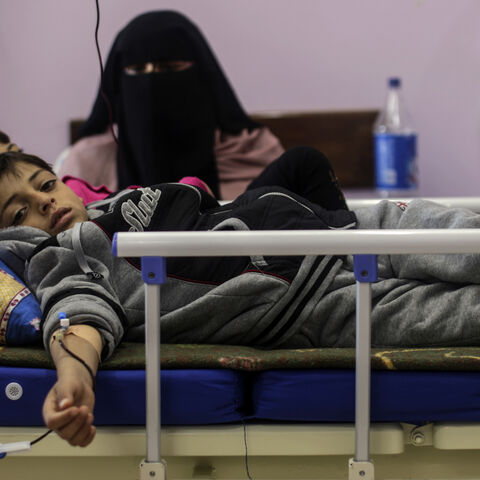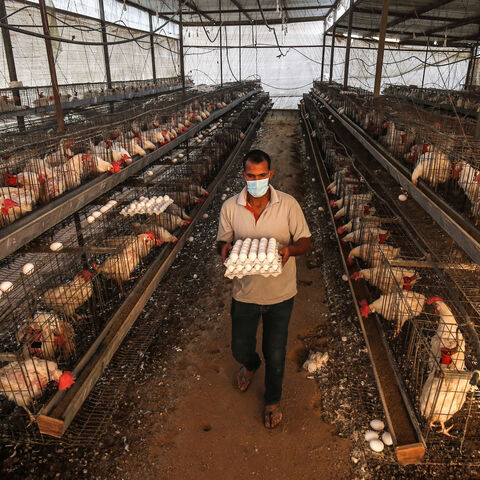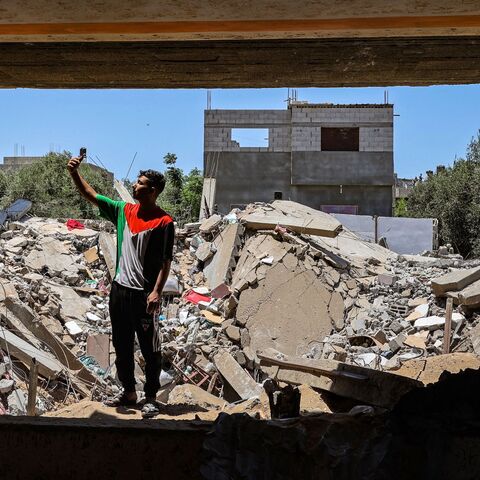ENTSAR ABU JAHAL :iniziati I campi estivi per i bambini di Gaza traumatizzati dalla guerra
Traduzione sintesi
GAZA CITY, Striscia di Gaza - L'8 giugno i campi estivi del Ministero dell'Istruzione, nominati "Gerusalemme nei nostri occhi", sono iniziati nella Striscia di Gaza per i bambini delle scuole elementari. Questi campi mirano a fornire supporto psicologico ed educativo e a fornire sollievo emotivo agli studenti traumatizzati per la recente escalation nell'enclave. Secondo i dati del ministero ,ottenuti da Al-Monitor, oltre 50.000 studenti si sono iscritti nei campi tenuti in 150 centri in tutta Gaza.
Durante la recente escalation Israele ha minacciato di bombardare la scuola elementare Al-Buraq, a ovest di Gaza City, ma ha finito per astenersi dal farlo. Oggi i bambini giocano nel suo cortile con il loro allenatore sportivo, mentre altri hanno i volti dipinti con la bandiera palestinese, infatti questi campi mirano a rafforzare l'identità nazionale tra gli studenti.
In una delle aule gli studenti scandiscano gran voce : "Gerusalemme è l'eterna capitale della Palestina" , sotto la guida dell' 'insegnante di educazione civica.
Abdel Qader Abu Ali , direttore del Ministero dell'Istruzione nella parte occidentale di Gaza, ha detto ad Al-Monitor che l'obiettivo di questi campi è fornire sollievo psicologico e intrattenere gli studenti che hanno sofferto momenti di di paura e di terrore. Più di 200 abitanti di Gaza sono stati uccisi, compresi bambini, molte case, edifici e altre strutture sono state distrutte dai bombardamenti israeliani. Questi campi contribuiranno anche a raffinare la personalità creativa, sociale e patriottica dei bambini e a promuovere i loro talenti .
Ha aggiunto che i campi comprendono quattro sezioni : supporto psicologico, arte e disegno, sport e giochi , promozione dei valori e dell'identità nazionale tra gli studenti. Ad ogni sezione è stato assegnato un insegnante specializzato, ricordando che il ministero ha dovuto chiudere l'anno scolastico all'inizio del 17 maggio a causa della guerra. La fascia di età ,compresa tra i 7 e gli 11 anni, è stata esposta a molte pressioni psicologiche ai suoni violenti dei bombardamenti , alle scene di distruzione e di morte. Un team di supporto è disponibile per fornire servizi psicologici agli studenti. "Le scuole statali [nella parte occidentale di Gaza] hanno perso 15 dei loro studenti, mentre altri 100 sono rimasti feriti e molti studenti hanno perso l'intera famiglia".
Abu Ali ha sottolineato che tutte le misure precauzionali COVID-19 vengono attuate nei campi. Il numero massimo è di 60 studenti al giorno in ciascun campo, divisi in quattro gruppi. Sono previste sei sessioni di due giorni ciascuna. l progetto durerà due settimane, dall'8 giugno al 21 giugno.
Safaa Jarada, la direttrice della scuola elementare Al-Buraq, ha dichiarato ad Al-Monitor che c'è stata una grande richiesta per i campi, ma il ministero ha specificato che ogni campo può accogliere solo un massimo di 360 studenti in totale per rispettare il distanziamento sociale a causa della pandemia di coronavirus. E' stato consigliato di indirizzare gli studenti a campi estivi meno affollati o addirittura di aprirne nuovi in altre scuole. "Non respingeremo gli studenti, perché ciò che hanno vissuto ,è troppo duro da sopportare".
La partecipazione di insegnanti donne ha un impatto molto positivo sugli studenti, che vengono al campo dalle 8 del mattino fino a mezzogiorno durante i giorni feriali, tranne il venerdì.“Gli insegnanti di educazione religiosa e nazionale sono responsabili dei corsi di identità nazionale e cercano di instillare negli studenti i valori religiosi e il senso di appartenenza nazionale”, ha continuato.
Così la sezione artistica collega l'arte alla patria, poiché agli studenti vengono insegnate le città palestinesi attraverso i disegni. Le ragazze indossano un'uniforme che simboleggia la bandiera palestinese, con un nastro rosso tra i capelli, una sciarpa bianca sul collo, un abito corto verde e pantaloni e scarpe neri.
L'area dedicata allo sport mira ad aiutare gli studenti a sfogarsi e ascaricarsi attraverso giochi e movimento fisici , mentre la sezione di supporto psicologico aiuta gli studenti a superare i traumi psicologici.
Da parte sua Ahmed Ayesh, direttore generale delle relazioni pubbliche e della cooperazione internazionale presso il Ministero dell'Istruzione, ha dichiarato ad Al-Monitor che ci sono 150.000 studenti registrati nelle scuole del ministero , ma solo 50.000 , a causa delle misure precauzionali per contrastare il Covid, possono partecipare . In ogni caso presto verrà formato un nuovo campo per un'altra fascia di età .
Ayesh ha sottolineato che i partner locali e internazionali del ministero hanno fornito il supporto finanziario necessario per l'istituzione di questi campi che costano oltre $ 100.000. Secondo le ultime statistiche del ministero, 77 studenti sono morti nella recente guerra a Gaza, di questi 26 iscritti in scuole affiliate al ministero, 19 in scuole affiliate all'agenzia delle Nazioni Unite per i rifugiati palestinesi e uno in una scuola privata. Un totale di 31 studenti delle superiore sono stati uccisi. Più di 100 scuole sono state danneggiate o distrutte il mese scorso. Il ministero non ha organizzato i campi nelle scuole danneggiate, perché voleva fornire un ambiente appropriato lontano da tutte le scene di distruzione.
GAZA CITY, Gaza Strip — On June 8, the Gaza Ministry of Education and Higher Education’s summer camps, dubbed “Jerusalem in our Eyes,” were launched in the Gaza Strip, targeting primary school students. These camps aim to provide psychological and educational support for children, and provide emotional release for students who were traumatized during the recent escalation in the enclave.
According to ministry figures obtained by Al-Monitor, over 50,000 students enrolled in the camps held in 150 centers across Gaza.
During the recent escalation that lasted from May 10-21, Israel threatened to bomb Al-Buraq Elementary School, west of Gaza City — but ended up refraining from doing so. Today, children play in its courtyard with their sports coach, while others have their faces painted with the Palestinian flag by their art teacher, as these camps aim to strengthen national identity among students. The conflict took place after Hamas objected to Israel's actions in Jerusalem, including the planned eviction of residents of Sheikh Jarrah and the Israeli raid on the Al-Aqsa Mosque.
In one of the classrooms, the students' voices were echoing loudly that Jerusalem is the eternal capital of Palestine, accompanied by the civics teacher.
Abdel Qader Abu Ali, director of the Ministry of Education’s directorate in western Gaza, told Al-Monitor that the goal of these camps is to provide psychological relief and entertain students who suffered fear and terror. More than 200 Gazans were killed, including children, and many homes, buildings and other facilities were destroyed by Israeli bombardment.
These camps will also contribute to refining the children’s creative, social and patriotic personality, and promoting their talents, he noted.
He explained that the camps include four sections, which are psychological support, arts and drawing, sports and games and the promotion of values and national identity among students. He added that a specialized teacher has been assigned to each section, pointing out that the ministry had to end the school year early May 17 in light of the war.
Speaking about the reason for enrolling children between the ages of 7 and 11, Abu Ali said that this age group was exposed to a lot of psychological pressure and that a child that is not even 11 years old cannot bear the violent sounds of bombing and the scenes of destruction and death, noting that a support team is available to provide psychological services to students.
“The government schools [in western Gaza] lost 15 of their students, while 100 others were wounded, and many students lost their entire families,” he continued.
Abu Ali pointed out that all COVID-19 precautionary measures are being implemented in the camps, with a maximum number of 60 students per day in each camp, divided into four groups. There are six sessions of two days each.
He added that the project will run for two weeks, from June 8 to June 21.
Safaa Jarada, the director of Al-Buraq Elementary School, told Al-Monitor that there was a big demand for the camps, which could not accommodate all students since the ministry specified that each camp could only receive a maximum of 360 students in total to respect social distancing because of the coronavirus pandemic. She said the ministry advised the camps to refer students to less crowded summer camps or even for new ones to opened in other schools. “We will not turn away any students who wish to join the camp, because what they have been exposed to as children is too much to bear,” she added.
She said the participation of female teachers has a very positive impact on the students, who come to the camp from 8 a.m. until noon during weekdays, except on Fridays, noting that the ministry sent four guides for the four sections, each of which accommodates 15 students per day.
“Religious and national education teachers are in charge of the values and national identity courses, and they seek to instill religious values and the sense of national belonging in students,” she continued.
Jarada explained that the artistic section links art to the homeland, as students are taught about Palestinian cities through drawings. She noted that girls wear a uniform that symbolizes the Palestinian flag, with a red ribbon in their hair, a white scarf on their neck, a short green dress and black pants and shoes.
She said the sports segment aims to help students vent and unload through games and physical movement, while the psychological support section is the prerogative of the psychological counselor who supports students in their emotional release.
For his part, Ahmed Ayesh, director-general of public relations and international cooperation at the Ministry of Education, told Al-Monitor that there are 150,000 students registered in the ministry’s schools but only 50,000 were registered in the camps in light of the coronavirus precautionary measures.
He noted that the ministry is trying to establish more summer camps to accommodate all the students wishing to benefit from the psychological and educational support they need in light of everything they just went through, adding that a new camp for another age group will be formed soon.
Ayesh stressed that the ministry's local and international partners provided the necessary financial support for the establishment of these camps, pointing out that they cost over $100,000.
He added that according to the ministry’s latest statistics, 77 students died in the recent war on Gaza, including 26 enrolled in schools affiliated with the ministry, 19 from schools affiliated with the UN agency for Palestinian refugees and one from a private school. A total of 31 higher education students were killed.
Ayesh said more than 100 schools were damaged or destroyed last month. He said the ministry did not hold the camps in damaged schools because it wanted to provide the appropriate environment for psychological support for students, away from all scenes of destruction.




Commenti
Posta un commento